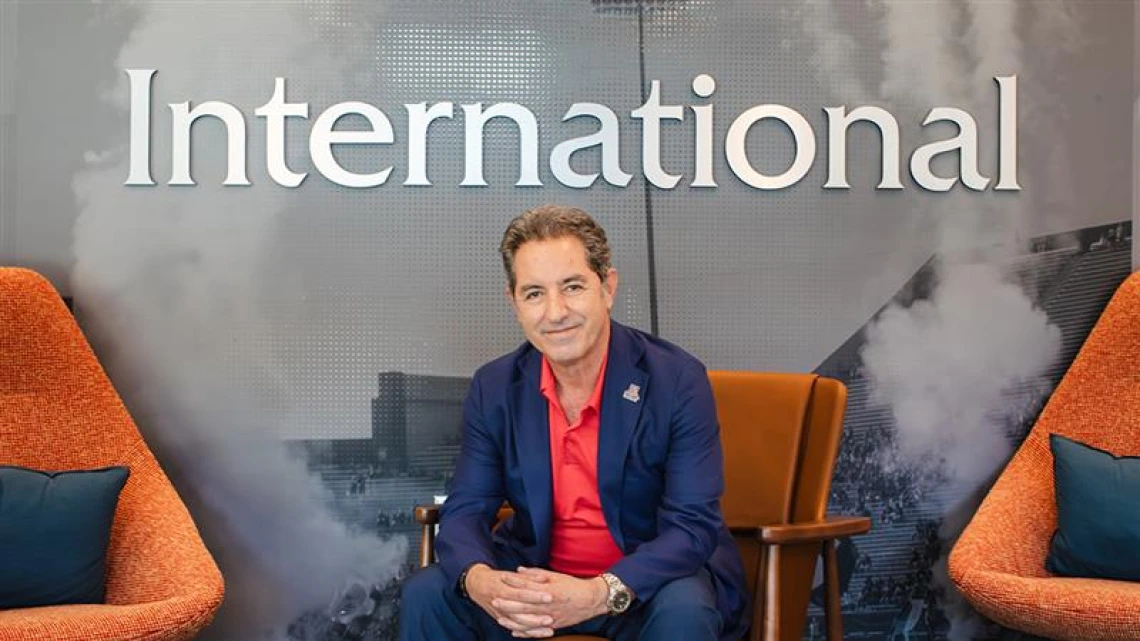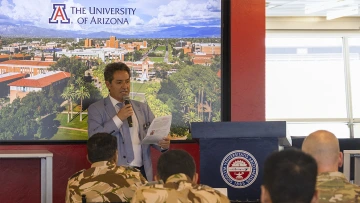Hassan Hijazi retires after decades of service to the University of Arizona

Hassan M. Hijazi, assistant vice president for Middle East and North African affairs at Arizona International retired at the end of September. His retirement marks the culmination of a distinguished career spanning over four decades of service to the university and the global academic community.
Hijazi’s journey began in the early 80s, when he left Lebanon during the civil war to pursue higher education in the United States. “I left Lebanon in 1980. There was a civil war going on, and I just wanted to get out,” he recalled. “It’s one of the most beautiful places on earth, but I knew I had to leave. I got accepted to multiple universities, but I chose the University of Arizona because I had a few friends here, and I heard about the city’s diversity and welcoming community.”
As a student worker in the small International Student Office, Hijazi assisted fellow international students in finding apartments, processing paperwork, and settling into life in Tucson. That early role gave him a sense of purpose that would shape the rest of his career. He went on to earn a bachelor’s degree in industrial engineering in 1985 and later, a master’s degree in international relations, blending technical training with a deep interest in diplomacy and global connections.
Laying the Groundwork for Global Impact
Hijazi’s professional life began with a career in public service. For 13 years, he served as district aide to Congressman Jim Kolbe, representing the office at community events and advising on issues related to education, science, space, and technology. Later, he became assistant director of federal relations at the University of Arizona, where, as he put it, his job was to “develop partnerships, keep track, and lobby our members of Congress for projects that benefit the University of Arizona and develop programs that create funding opportunities through the federal government.”

Assistant Vice President, Middle East and North African Affairs Hassan Hijazi addresses the Sultanate of Oman Armed Forces delegation in 2023.
In 2007, Hijazi transitioned into the sciences as director of external affairs at Biosphere 2. In this role, he developed strategic plans for funding, public relations, and outreach initiatives to advance the missions of the College of Science and Biosphere 2. “Supporting these activities required close collaboration with university administrators and personnel, while also building professional relationships with businesses, foundations, community leaders, international alumni, foreign governments, and local, state, and federal officials and agencies,” Hijazi said. His work helped Biosphere 2 become a recognized site for groundbreaking research in the College of Science.
In 2012, Hijazi realized a personal dream by returning to international education. As director of international alumni and development, he began growing the university’s international alumni network. “For the longest time, the university hadn’t really engaged international alumni,” he said. “Records were outdated—no cell phones, no real contact information. I was proud to rebuild that network, especially in the Gulf Cooperation Council (GCC) countries. That’s where we began the ambassadorship program, identifying individuals of influence who could serve as our ambassadors. They hosted events, supported recruitment, and reconnected alumni with the U of A.”
Through this work, he helped cultivate alumni whose leadership opened doors to extraordinary collaborations. One project particularly close to his heart was the Million Date Palm Project in Oman, a nearly $4 million initiative through the College of Agriculture, Life and Environmental Sciences aimed at building laboratories that support the region’s vital date palm industry. “The labs trained people on how to protect their main crop, dates, against disease, salinity, and environmental stress. What I’m most proud of is that it wasn’t just about building labs; it was about creating a lasting impact. It was about creating capacity, training the next generation, and showing that U of A can provide real solutions to global challenges,” he explained.
As assistant vice president, Hijazi also helped launch U of A microcampuses and dual-degree programs at leading universities in the Middle East. “We were successful in implementing new microcampuses in the region. Partners were very interested in the University of Arizona and the programs we had to offer,” he said.
His leadership in these initiatives not only strengthened the university’s academic reach abroad but also earned him respect from colleagues and partners alike. Reflecting on his impact, Dr. Jenny Lee, vice president for Arizona International and dean of international education, shared: “Hassan’s work has notably shaped U of A’s presence in the Middle East. Through his vision and dedication, he built strong partnerships, fostered relationships with alumni networks, and expanded opportunities for students and faculty abroad. His ability to connect people across cultures has left a mark on the University of Arizona and on the communities we serve globally. We are truly grateful for his leadership and the legacy he leaves behind.”
A Philosophy of Relationships

Hassan and Yunchen Liu, University of Arizona graduate of the Master of Music (2016) and Doctor of Musical Arts (2024) programs.
At the heart of his achievements lies Hijazi’s philosophy of relationship building. “First, you have to understand the culture,” he said. “Then you build the relationship on integrity and honesty. These individuals believe in the value of personal interaction and the friendships they build. If they do something good for you, do something good for them in return. That’s how partnerships last.”
He made a point of honoring alumni, not only for their support but also for their personal success. One alumnus who helped secure a major project was later brought back to Tucson and honored with the Distinguished Alumni Award. “That meant the world to him,” Hijazi remembered. “He didn’t expect it, but we wanted him to know that we saw him not just as a partner, but as family.”
Looking Ahead: Continuing Service
Over the years, Hijazi also began a tradition of service to the Tucson community. He has served with Arizona Public Media, the Center for Middle Eastern Studies, World Care Relief Organization, Voices for Education, and the Tucson Arizona Boys Chorus, among others. “This community has been so good to me,” he explained. “Tucson is diverse, full of kind people. I wanted to give back, and the best way was to serve on their boards and support their causes. That won’t change with retirement. I’ll keep giving back to a community that gave me so much.”
And although he is retiring, Hijazi will remain connected to the university as a special consultant, lending his expertise and connections to the continued development of partnerships in the Middle East.
In reflecting on this next chapter, he acknowledges both the personal meaning of his long career and his desire to continue contributing to the institution he calls home. “Being at the U of A all these years—it becomes part of you. More than half of my life has been tied to this institution. The friends I’ve made, the people I’ve worked with, they mean the world to me. Retiring is bittersweet. It’s a new chapter, time to spend with family and to travel, but I’ll always be here, ready to help however I can,” he said.

